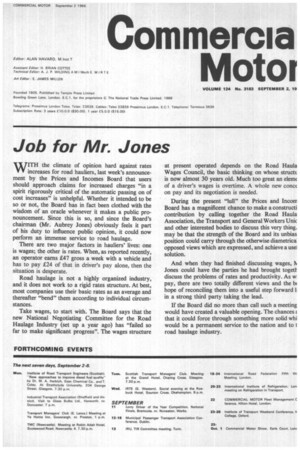Job for Mr. Jones
Page 21

If you've noticed an error in this article please click here to report it so we can fix it.
WITH the climate of opinion hard against rates increases for road hauliers, last week's announcement by the Prices and Incomes Board that users should approach claims for increased charges "in a spirit rigorously critical of the automatic passing on of cost increases" is unhelpful. Whether it intended to be so or not, the Board has in fact been clothed with the wisdom of an oracle whenever it makes a public pronouncement. Since this is so, and since the Board's chairman (Mr. Aubrey Jones) obviously feels it part of his duty to influence public opinion, it could now perform an immense service to road haulage.
There are two major factors in hauliers' lives: one is wages; the other is rates. When, as reported recently, an operator earns £47 gross a week with a vehicle and has to pay £24 of that in driver's pay alone, then the situation is desperate.
Road haulage is not a highly organized industry, and it does not work to a rigid rates structure. At best, most companies use their basic rates as an average and thereafter "bend" them according to individual circumstances.
Take wages, to start with. The Board says that the new National Negotiating Committee for the Road Haulage Industry (set up a year ago) has "failed so far to make significant progress". The wages structure at present operated depends on the Road Haula Wages Council, the basic thinking on whose structi. is now almost 30 years old. Much too great an elemc of a driver's wages is overtime. A whole new concc on pay and its negotiation is needed.
During the present "lull" the Prices and Incom Board has a magnificent chance to make a constructi contribution by calling together the Road Haula Association, the Transport and General Workers Unic and other interested bodies to discuss this very thing. may be that the strength of the Board and its unbias position could carry through the otherwise diametrica opposed views which are expressed, and achieve a use] solution.
And when they had finished discussing wages, N Jones could have the parties he had brought togetI discuss the problems of rates and productivity. As w pay, there are two totally different views and the bt hope of reconciling them into a useful step forward 11 in a strong third party taking the lead.
If the Board did no more than call such a meeting would have created a valuable opening. The chances that it could force through something more solid whi would be a permanent service to the nation and to t road haulage industry.
































































































































